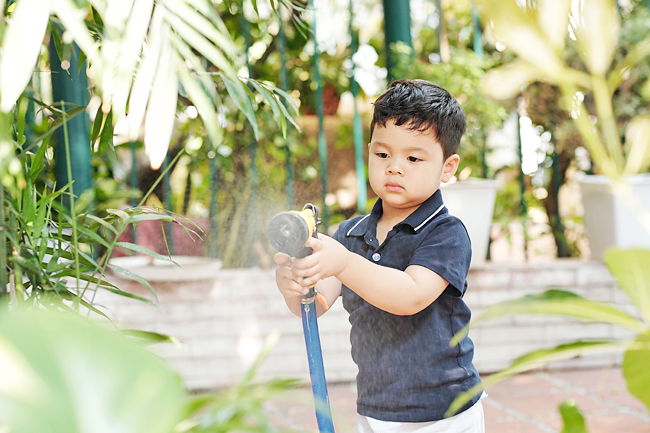ANN/THE STAR – Encouraging children to participate in household chores can be a valuable method for nurturing their confidence, character, and independence.
As they mature, they’ll naturally develop a sense of responsibility toward contributing to household tasks, benefiting both the family unit and fostering a positive habit.
Nonetheless, integrating chores into a child’s routine should be approached gradually rather than abruptly. It’s crucial to start with small steps and progressively introduce age-appropriate tasks.
According to clinical psychologist Dr Pamilia Lourdunathan, determining suitable chores for children should involve a process of trial and error, tailored to each child’s abilities.
Dr Lourdunathan suggested that the ideal time to begin involving children in regular household tasks is during their toddler years, setting a foundation for their ongoing participation in chores as they grow older.
“Simple, age-appropriate tasks can be introduced as early as two to three years old,” she added. As creatures of habit, toddlers have a strong likelihood to embrace and thrive on routines, she said. “For them, a new activity can sometimes interrupt their routine but parents should not underestimate their maturity and level of understanding.”
Known for his work on child development, developmental psychologist Jean Piaget, in his 1936 theory of cognitive development suggested that a child only begins to develop abstract reasoning between the ages of 11 and 14 – a phase that is called the formal operational stage.



“Children are only capable of higher order brain functions during this phase. However, logical reasoning can begin at least potentially around six to eight years of age in a majority of children; and during this period they can be included in the running of the house,” she added.
START YOUNG
Lecturer Siti Hajar Abdul Aziz, 47, who is a mother to three girls aged between 10 and 16, said she started introducing small tasks to her daughters when they were five.
“For instance, Nur Qaisara Hisyamuddin, 10, is responsible for simpler tasks like setting the dinner table. My eldest, Nur Qistina, 16, handles more complex duties like meal preparations,” she added.
Siti Hajar said she works together with her husband in tailoring chores based on their children’s age and abilities.
“This ensures a balanced and fulfilling experience for each child,” she added. Bernice Foong, nine, has been exposed to house chores since she was six years old.
“I started her with light tasks like tidying up her play area by putting the toys back into their boxes and helping me hang the laundry,” said Agnes Kok, 43, about her only child. These tasks, the director of events and F&B sales said, help train her daughter to keep the house neat and tidy.
Pamilia added: “I once visited a shelter home, which had one teen assigned to a space like the dining room, prayer room, garden and toy room. Each space was labelled with the teen’s name.
As a result of this assignment and autonomy, the home was able to maintain a smooth system of chores and can retain its cleanliness,” said the assistant professor at the Department of Psychology of International Islamic University Malaysia (IIUM).
SHARED RESPONSIBILITIES
Siti Hajar and her husband said they take a gradual approach to chores. They believe that chores are shared responsibilities so at first, the couple started doing them together with their children.
“This means tasks are done collectively, with us leading and instructing to make sure the chores are completed and done correctly. Once they have grasped the basics, we let them take on individual responsibilities independently,” she added.
Siti Hajar said her household chores are regularly rotated among her daughters to allow each child to undertake different duties.
“But since they are of different ages, they have specific chores assigned to them. For example, Nur Qistina will cook a few times a week and will manage the laundry with the help of her younger sisters,” she added.
In Kok’s small family, the distribution of chores is between her and her husband.
“But what we do is share our tasks, especially simple and easy ones, with Foong. We also add a fun element to them, like who does them faster and cleaner,” said Kok.
Siti Hajar agreed that chores should not be treated as just chores: “Transforming chores into a bonding experience has been highly effective for us.
“We often share stories and jokes or play some music while doing laundry. This helps turn mundane tasks into enjoyable moments,” she added.
Pamilia offers a three-step approach: Identifying the ‘why’, planning the ‘how’ and explaining the ‘what’. She said parents play a crucial role in guiding their children to grasp the fundamental ‘why’ behind chores, as reasoning effectively resonates with kids.
“When children comprehend the purpose behind a specific task, their commitment to performing it is heightened,” she added.
The next step, she said, is to get children actively engaged by not only demonstrating the proper execution of chores but also by indicating the optimal ‘when’ for their completion.
“This will empower children, while fostering a sense of autonomy as they take charge of these tasks,” she said.
Pamilia said parents should offer a clear breakdown of specific activities and tasks, complete with suggested timelines, to aid their children in gauging the duration of their engagement. – Zalina Mohd Som



